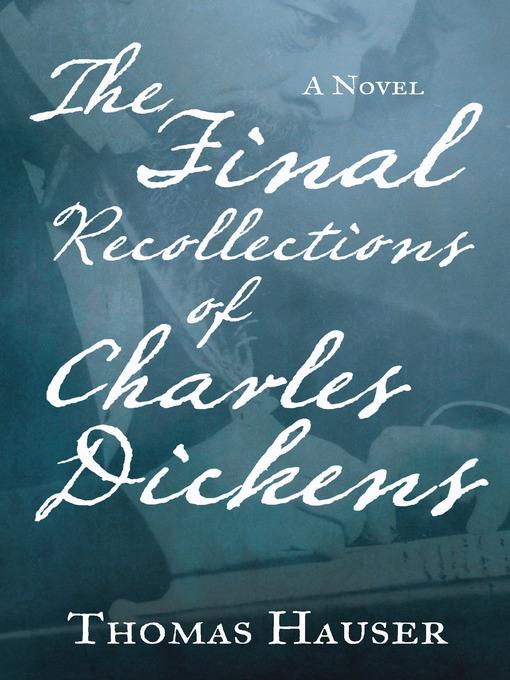
The Final Recollections of Charles Dickens
A Novel
کتاب های مرتبط
- اطلاعات
- نقد و بررسی
- دیدگاه کاربران
نقد و بررسی

Starred review from September 1, 2014
Before Charles Dickens became a famous British novelist he was a struggling London journalist, inspired by the poverty, disease, hunger, and despair of the city’s lower classes, and exposed to the arrogance and indifference of the rich. This beautifully crafted historical novel by the prolific Hauser (Waiting for Carver Boyd) is a fictional autobiography of Dickens. Speaking from 1870 when his health is failing, he recounts his miserable childhood, early writing career, loveless marriage, and later fame. The core of the story, however, focuses on the year 1836, when he is introduced by his editor, George Hogarth, to a wealthy financier, Geoffrey Wingate. With Hogarth’s blessing, Wingate encourages Dickens to write about him and his investment business in the Evening Chronicle, for the dual purpose of attracting readers and advancing Wingate’s business interests. Wingate is hoping to use the young, naïve journalist to lure rich clients. Dickens’s initial inquiries reveal much about Wingate’s business, including a rumor that he once killed a man. Intrigued, Dickens investigates further, uncovering cold-blooded murder and mutilation, as well as London’s seamy underworld of prostitution and the kept women of aristocrats. Dickens takes his suspicions of Wingate’s crimes to the police, only to find rampant corruption. But he does find an honest policeman in Inspector Ellsworth of the Metropolitan Police Force, a man of integrity and grit who believes Dickens, and the two men work tirelessly to unmask a clever swindler and vicious killer. Complications arise when Dickens falls hopelessly in love with Amanda, Wingate’s wife—their unfulfilled love affair haunts Dickens for the rest of his life. Hauser delivers a crisp, colorful narrative with vivid pictures of London’s rich and poor, as well as a suspenseful, perilous drama in the style of Dickens.

October 15, 2014
A risky pastiche presents itself as the memoir of 59-year-old Charles Dickens, confessing the "most important chapter of my life"-his secret, undying love for the wife of a vicious scoundrel.It takes a bold writer to mimic the voices of geniuses, but Hauser (Waiting for Carver Boyd, 2011, etc.), author of some 47 works of fiction and nonfiction, has gone down this road before and breezily "comingles" his words with those of a much-loved true-life author once again. Cantering through the facts of Dickens' life (born 1812; father imprisoned for debt; miserable episode in a blacking factory; prodigious invention; eventual fame and fortune; marital breakdown), Hauser pauses to insert a lurid episode of prostitution, mutilation, fraud and murder revolving around the villainous character of Geoffrey Wingate. An established, unmarried journalist on the threshold of success, the young Dickens is invited to write a sketch of Wingate. Research leads him to the impoverished victims of Wingate's rapacious and brutal actions, but it's Wingate himself who introduces Amanda, his beautiful, unpredictable wife, whose harsh upbringing chimes with Dickens' strong views on social reform. Bringing in a police inspector to help investigate Wingate's crimes, Dickens-still a virgin-finds himself falling under Amanda's spell, all the more so when she appears at his home one night with a bottle of wine and surprising undergarments. Hauser's attempt at a Dickensian voice falls short. Instead, he offers a simple, sketchy tale starring Dickens as a sad workaholic whose late re-encounter with Amanda only serves to send him to his grave with a shattered heart.Inauthentic and skimpy. Dickens fans should stick to the unparalleled originals.
COPYRIGHT(2014) Kirkus Reviews, ALL RIGHTS RESERVED.

November 1, 2014
Hauser (nominated for the Pulitzer Prize and the National Book Award for his nonfiction works Missing and Muhammad Ali: His Life and Times) channels the great English novelist in his new novel. In 1870, in poor health and at the end of his writing career, Charles Dickens still has one more story to tell. And what a story it is--fit for the plot of a classic Dickens composition. In his youth, just as Sketches by Boz was earning him attention, the Victorian author meets the powerful and wealthy Charles Wingate. Researching Wingate for his column, Dickens unearths an appalling incident from the successful businessman's past, involving a mutilated prostitute and murder. Revealing Wingate's unsavory deeds could destroy the man's position in society, but, more important to Dickens, the truth could also destroy Wingate's beautiful wife, Amanda, with whom he has fallen in love despite his engagement to his publisher's daughter. VERDICT Hauser's mastery of Dickensian language and dramatic flair creates engaging historical fiction, and his depiction of Dickens's social philosophy of championing the poor will resonate with contemporary readers who are concerned about income inequality. Fans of the 19th-century author or of well-researched historical fiction will savor this work.--Barbara Clark-Greene, Groton P.L., CT
Copyright 2014 Library Journal, LLC Used with permission.

























دیدگاه کاربران